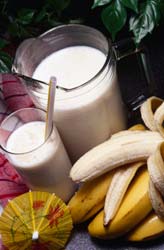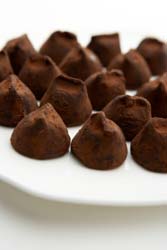Top 9 Things You Thought Were Bad For You… Are Actually Good!
by www.SixWise.com
Many Americans strive to live healthy -- they eat lots of fruits and veggies, exercise regularly, and try to keep a positive, sunny outlook. In fact, according to the Gallup-Healthways Well-Being Index (WBI), an in-depth measure of Americans' exercise, eating, and smoking habits, healthy habits rose beyond 2008 levels for much of 2009.
But in your quest to live healthier, are you inadvertently excluding some healthy behaviors in the mistaken belief they’re bad for your health? Just when you thought you had it all figured out … here are nine lifestyle habits you thought were bad for you … but are actually good!
 1. Leaving Some Dirt Behind While Cleaning
1. Leaving Some Dirt Behind While Cleaning
Do you douse your kitchen, bathroom and every surface in between with antibacterial disinfectants and chemical cleansers in the hopes of removing every possible germ, bacteria, virus and dust mite?
Well, if your environment is too clean it will not provide the necessary germ exposures needed to “educate” your immune system so it will know how to launch defenses against infectious organisms. Not only can it make your immune responses inadequate, but it may cause your immune system to overreact to substances in your environment that would ordinarily be harmless, such as pollen, dust or pet dander.
Studies have shown, for instance, that young children who spend time in daycare (and therefore are exposed to a wide variety of germs) are less likely to develop allergies and asthma, as are those who grew up on farms, with pets or in large families. Other research has shown that children who grow up in very clean homes have a higher risk of developing inflammatory bowel disease
You should strive to keep your home clean … but not sterile.
Further, if you’re using harsh chemical cleaners, you could also be harming your health. A truly clean home shouldn't smell like anything, so if your “clean” home smells like a pine tree or artificial lemon grove, it’s a sign that toxins are lingering.
Researchers from the University of California-Berkeley and Lawrence Berkeley National Laboratory analyzed 21 household cleaners and air fresheners and found that many -- especially those with pine, lemon or orange scents -- emit excessive levels of toxic pollutants.
Six of the products contained ethylene-based glycol ethers, which are classified as hazardous air pollutants by the U.S. Environmental Protection Agency. Meanwhile, 12 products contained terpenes, which are found in the pine, lemon and orange oils used to give cleaning products their "clean" smells. Terpenes have been found to react with ozone to produce a variety of toxic substances.
This is why gentle cleansers, such as Liquid Sunshine Non-Toxic Cleaner, are superior to disinfecting detergents. Another option is to use PerfectClean Antimicrobial Microfiber Terry Cloths, Dusters and Mops, which pick up microscopic contaminants with no cleaners needed at all!
PerfectClean terry cloths contain patented built-in antimicrobial protection and are made of ultramicrofibers that are only 3 microns in size, which is even smaller than many bacteria. Because of this unique ultramicrofiber construction, you can reduce the amount of chemical cleaners you use, or even eliminate them altogether.
So, unlike ordinary cleaning rags and sponges, you don't need to use chemical cleaners to achieve the deepest clean, which makes them perfect for anyone who's looking to keep toxic cleaners OUT of their home.
 2. Eating Fast Food
2. Eating Fast Food
Typical fast-food (burgers, fries, chicken nuggests, etc.) are definitely not health foods. A typical fast-food hamburger contains loads of calories, sodium and sugar, and is pumped full of antibiotics and pesticides.
Plus, “a single hamburger may contain meat from hundreds of animals," according to the CDC. Because so many products have been mingled together, the risk of contamination is higher than eating meat from just one animal. For instance, if any one animal out of the hundreds that were added to a large batch of ground beef is contaminated, the whole batch becomes contaminated.
And French fries are loaded with acrylamide and trans fats. When the Center for Science in the Public Interest conducted tests on some popular brands of French fries, they found that the acrylamide in a large order of fast food fries was at least 300 times the amount allowed by the Environmental Protection Agency (EPA) in a glass of water.
That said, “fast food” does not have to be bad for your health. You can create an incredibly healthy, fast meal in minutes using the unique and delicious recipes in the cookbook “Alive in 5”: Raw Gourmet Meals in Five Minutes.
In “Alive in 5,” acclaimed raw chef Angela Elliott shows you how to whip up mouth-watering lasagna, spaghetti marinara, stuffed mushrooms, broccoli in cheese sauce, apple pie, decadent whipped cream and strawberries, chocolate shake, and more -- all in about five minutes, with easy-to-find ingredients and just a blender or food processor.
She shares her personal wellness journey and her playful enthusiasm to make the book an enjoyable and inspiring guide to delicious -- and fast -- food!
 3. Eating Raw Food
3. Eating Raw Food
You’ve been warned about eating undercooked food and its potential to cause food poisoning, but some food is actually healthier in its raw form.
Raw plant and animal foods (such as raw milk) are loaded with beneficial enzymes for your body. Enzymes are special proteins that act as catalysts for the chemical reactions that occur to keep your body functioning. However, enzymes begin to be destroyed at temperatures above 110-115 degrees. So if your food is cooked, pasteurized or processed, it will contain no enzymes whatsoever.
Even though your body produces some enzymes on its own, if you’ve been eating only cooked foods for a long time, your body must divert extra energy to producing more and more enzymes to break down this food.
This puts a strain on your digestive organs, including your pancreas, and some say may cause premature damage to these organs that can impact your overall health.
Aside from depleting the enzyme content, certain cooking methods, namely those that use high temperatures, actually create harmful compounds in your food.
This is why eating raw foods can actually be very beneficial for your health. Be generous with consuming raw fruits and vegetables, and also consider adding other sources of raw food to your diet, such as raw milk, raw organic eggs and raw-milk cheese.
Another option if your diet consists primarily of cooked foods is to take an enzyme supplement. There are numerous enzyme supplements available on the market to help increase your levels, but Sixiwse.com highly recommends the plant-based, acid-resistant digestive enzyme formulation, AbsorbAid Platinum from NutritionsFinest.com.
This vegetable-based digestive enzyme system combines its effective ratio of proteases, amylases, lipases and cellulases with two “acid-tolerant” bacteria or a probiotic combination, Lactobacillus acidophilus and Bifidobacterium bifidum.
This product addresses not only the digestive enzyme system deficiencies recognized in most adults, but it combines two effectively beneficial bacterial strains that are metabolically complementary and help create a symbiosis with the digestive enzyme system complex and helps promote immune system excellence.
Further, AbsorbAid Platinum by NutritionsFinest.com is manufactured by a company that offers superior, quality standards in its manufacturing and filling operations.
So while eating more fresh, raw foods will help keep your enzyme stores at a healthy level, if you don’t eat many raw foods, or are looking for a bit of extra insurance, taking a high-quality enzyme supplement is a smart move.
 4. Eating Red Meat
4. Eating Red Meat
Red meat has been shunned by many health-conscious Americans because of its saturated fat content, and its widely reported link to high cholesterol.
However, you can eat red meat and still be healthy. The American Dietetic Association advises that Americans can eat six ounces of lean red meat five or more days a week and still be eating a diet that could decrease cholesterol levels. Surprisingly, they say lean beef is just as effective as skinless chicken when it comes to lowering cholesterol.
In fact, it may be that red meat has been unfairly vilified. A three-ounce serving of beef provides 50 percent of the daily recommended protein, along with beneficial B vitamins. And as for all that saturated fat, according to the ADA "more than half the fatty acids in beef are monounsaturated, the same type of fatty acids found in olive oil and championed for their heart-healthy properties. In addition, approximately one-third of the saturated fat in beef is stearic acid, which is shown to have a neutral effect on blood cholesterol."
Further, when it comes to red meat, choosing sources that have been raised in humane, natural ways -- which means being raised on pasture, or grass-fed -- is the healthier choice, according to many experts.
Grass-fed beef has been found to contain less fat and more omega-3 fatty acids, conjugated linoleic acid (CLA) and other beneficial compounds compared to grain-fed beef.
 5. What Environment Makes You Feel Stressed
5. What Environment Makes You Feel Stressed
Chronic stress, the type that causes you to feel anxious and on-edge for days on end, is a definite no-no.
Not only does chronic stress and anxiety interfere with your immune system, making you vulnerable to illnesses like the flu, it impairs your body's ability to respond to its anti-inflammatory signals, putting you at an increased risk of allergies, autoimmune diseases and heart disease.
However, not all stress is bad stress. It is not accurate to speak of stress in only negative terms, as, to a point, stress is actually good for you. It provides a burst of energy, a boost to your immune system and allows you to accomplish more.
Examples of good stress include exercise or the burst of adrenaline you get while completing a challenging task.
“It [Good stress] can motivate you into action and clear the mind,” Judith Orloff, MD, author of Emotional Freedom and a psychiatrist at UCLA, tells Elle magazine. “The stress hormones help make you more present, so you are sharper.”
 6. Drinking Sweet Drinks
6. Drinking Sweet Drinks
Sweet drinks like soda have picked up the blame for several epidemic health problems ranging from diabetes and tooth decay to hyperactivity and obesity.
The dangers of these sweetened beverages begin with the ingredients. For example, the average cola contains a mix of carbonated water, caramel color, natural flavors, caffeine, phosphoric acid and high-fructose corn syrup.
One of the worst ingredients in this list is high-fructose corn syrup, which provides practically no nutritional value, but contains an abundance of calories -- and may be even worse for you than sugar. Further, recent studies have found it is often contaminated with toxic mercury!
Phosphoric acid is another ingredient that keeps soda on the top of the unhealthiest beverage list. It is a chemical added to soda to give you that zing or sour flavor at the same time breaking down starches into sugar.
However, phosphoric acid and the caffeine that’s often in soda is a combination that could be bad for your bones. While caffeine can interfere with your body's ability to absorb calcium or increase the amount it gets rid of, the acids in soda can cause your body to become more acidic -- causing it to release even more calcium.
But you do not have to give up your sweet drinks entirely. You can turn this “guilty pleasure” into a healthy pleasure by swapping your sodas for Ajmera’s line of all-natural delicious beverages from AjmeraIncredibles.com. These 100 percent natural drinks with no preservatives and no artificial flavors or colors come in six delicious flavors:
-
Orange-O Energy contains vitamin C, an antioxidant that can protect your body from free radicals, which may cause heart disease and cancer. Vitamin C is responsible for producing collagen. Collagen is present in your muscles and bones and holds the cells together. Vitamin C also helps your immune system, helping you heal from scrapes and bruises, and keeps your gums healthy.
-
CoCo Energy is made with coconut water, which is a Natural Isotonic Beverage -- it has the same level we have in our blood, thus does not have an adverse affect on blood sugar or pressure. Coconut water contains more potassium (at about 294 mg) than most sports drinks (117 mg) and most energy drinks. It also has less sodium (25mg) whereas sports drinks have around 41mg and energy drinks have about 200 mg!
-
Xpress Chai is creamy and delicious, and like its name implies, takes just an instant to make. The chai packets are great for taking to work or when you’re in a hurry, as you simply add hot water and your cup of tasty chai is ready. Try it in Spice, Cardamon or Plain.
-
Saffron Pistachio Milkshake: Saffron Pistachio Milkshake, also known as Thandai, is an exotic drink served during the festival of colors in India. This refreshing and healthy drink offers instant energy, keeping your body cool and mind energized.
 7. Digesting and Eating Bacteria
7. Digesting and Eating Bacteria
Though it may not sound appetizing, researchers are beginning to realize the importance and benefit of regularly taking probiotics, or good bacteria.
According to a Webcast from Harvard Medical School:
“[There is] encouraging scientific evidence that probiotic administration may prevent and reduce the immune-mediated disease trend. Probiotics are living organisms, which when administered in adequate amounts, confer a health benefit on the host.
Regular consumption of certain probiotics can help regulate the balance of bacteria in the digestive tract and reinforce mucosal defenses that helps limit the propagation of immune mediated disease bacteria. Probiotics have been used historically by many societies worldwide to promote health.”
In fact, 70 percent of your immune system is located in your digestive system, which means that if your gut is overrun with bad bacteria, there’s a good chance your immune system will not be functioning at its best.
On the other hand, if your gut is being fortified with good bacteria, or probiotics, your immune system will be fully functioning and have the best chance of fighting off any disease-causing bacteria it encounters.
In choosing a probiotic supplement for yourself, Sixwise.com highly recommends AbsorbAid Probiotic from NutritionsFinest.com -- a superlative probiotic supplement that provides clinical activities supporting systemic health and wellness through immune-system protection, allergy reduction and effective and enhanced nutrient absorption.
AbsorbAid Probiotic has 30 billion organisms per capsule, with two clinically effective and dominant genera Bifidobacterium and Lactobacillus: L. acidophilus and L. salivarius in a 2:1 ratio and B. lactis and B. breve, also in a 2:1 ratio. Each bacterial genus-species has its own specific metabolic activities, which lead to their effective inter-species synergism.
Studies have shown that probiotics may be helpful with immune system modulation and allergies, so it’s a simple step that may help keep you and your family in the best health possible.
 8. Getting Out in the Sun
8. Getting Out in the Sun
You’ve been warned not to go out in the sun because it may increase your risk of skin cancer. However, because many people no longer spend much time in the sun without sunblock (sunblock blocks vitamin D production) vitamin D deficiency is thought to be very widespread.
Low vitamin D levels are now linked to increased risks of heart disease, cancer, stroke, hypertension, autoimmune diseases, diabetes, depression, chronic pain, osteoarthritis, osteoporosis, muscle weakness, muscle wasting, birth defects, periodontal disease, and more.
Sun exposure (without burning) is the best form of vitamin D, but if you cannot get out in the sun regularly, experts recommend supplementing with a vitamin D3 supplement, which is the same natural vitamin D your body makes when exposed to the sun.
Along with regularly testing your blood levels of vitamin D to make sure you’re in the optimal range -- not too high or too low -- you should make sure your body has the best chances of absorbing the vitamin D.
Because vitamin D is an oil-soluble vitamin meant to be made by your skin, it is not well absorbed. So you will want to take it in an oil-based form, and also make sure you use AbsorbAid Platinum from NutritionsFinest.com, a vegetable-based digestive enzyme, as a transfer agent. AbsorbAid Platinum will aid the breakdown and absorption of vitamin D present in foods such as fortified cereals, milk, juices, and oily fish, as well as the vitamin D in supplement form.
 9. Eating Chocolate
9. Eating Chocolate
Milk chocolate may put a smile on your face, but if you want to indulge in chocolate and still get a health boost, try dark chocolate (the darker, the better).
Not only is dark chocolate full of beneficial antioxidants, but it also causes your body to release endorphins and serotonin, which act as antidepressants. So if you’re craving a sweat treat, try a square or two of organic dark chocolate -- it’s the sweetness you desire with absolutely no guilty feelings required!
Recommended Reading
Five Diet Foods That are (Far) Worse Than What They're Replacing
The Top 8 Unhealthy Things People Love to Ruin Their Salads With
Sources
Elle.com June 22, 2009
Gallup-Healthways Well-Being Index
UC Berkeley News May 22, 2006